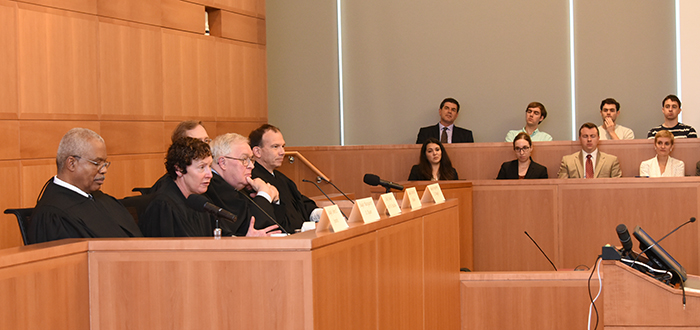On September 13, the United States Court of Appeals for the Armed Forces heard oral arguments in Fordham Law’s Gorman Moot Court Room for a sexual assault case involving two active members of the U.S. Army.
The sitting was part of the court’s Project Outreach, which gives civilians an inside look at military hearings. Military counsel and Fordham Law student amici from each side presented their arguments before the panel of judges, led by Chief Judge Scott W. Stucky.
Prior to the appeal, Specialist Andrew J. Criswell had been convicted of making a false official statement, abusive sexual contact, assault and battery, and indecent language in violation of Articles 107, 120, 128, and 134 of the Uniform Code of Military Justice. A main issue was whether or not Specialist AM, the victim of the alleged assault, had been able to reliably identify her attacker, given that the incident took place in a crowded, loud dance party, with strobe lights constantly flashing; moreover, her initial description of the attacker was vague, with a more complete description coming only after the accuser had seen a Facebook photograph of Criswell.
Captain Cody Cheek, the military counsel for the appellant, began by questioning the accuser’s eyewitness account before the panel. “She testified this was a very brief encounter, and that she was looking away during the assault,” the counsel noted.
Student amicus Rachel Goot, a 3L, followed up by presenting scientific evidence to suggest cross-racial identification is highly unreliable (Criswell is black and Specialist AM is white). Furthermore there were approximately 300 individuals at the event, many of them black males. Given the extremely vague nature of the accuser’s initial description of her assailant, Goot argued, clear and convincing proof of her assailant’s identity could not be established. The judge who convicted Criswell had failed to sufficiently consider these details, Goot concluded.
Following the two arguments on behalf of the appellant, Captain Natanyah Ganz, military counsel for the appellee (the United States of America) made her arguments. Specialist AM, she noted, had “ample opportunity to get a good look at the assailant,” as he allegedly approached her to make disrespectful comments before the assault, and approached her again after the assault, making more inappropriate comments. The counsel also noted that her identification of Criswell through a Facebook photo occurred only a few hours after the alleged assault, rather than days or weeks, and could thus be judged reliable.
3L Meg Tomlinson, student amicus for the appellee, added that there is significant risk in placing too much emphasis on stress. In fact, the scientific research on stress is mixed, and some studies suggest that it may actually aid a person in forming memories.
Following a brief rebuttal from Captain Cheek, the session was adjourned, and the panel of judges took general questions (i.e., not related to the case) from the audience of more than 150, which included 26 cadets from the U.S. Military Academy at West Point. The judges had lunch afterward with the cadets, the Fordham Law students who had argued the case, and members of Students for the Education and Representation of Veterans.


